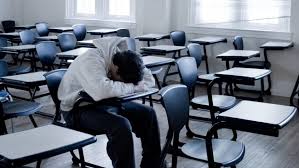
Recently, the CBC quoted Dr. Jennifer Crosbie, a clinical psychologist at Toronto's Hospital for Sick Children, who recognized the value of fidget toys but believed that spinners were more toy than tool and weren't likely to have the desired effect on students.
They definitely don't have the attributes that are generally associated with the kinds of fidget and sensory toys that are traditionally used with kids with a range of conditions. For one thing, a fidget toy should involve some movement or motion on the part of the child using it, which allows them to release excess energy. It actually kind of addresses that need to move around and allows them to be focusing on something else,
She sees spinners as more of a distraction rather than a means of finding focus. However, for students with high anxiety, or ASD, sometimes a distraction or this kind of repetitive outlet is exactly what the doctor ordered. As we all know, the effectiveness of a fidget, is really determined by the needs and attributes of the student using it. While the availability of fidget tools is a key part of universal design for learning, each one is not universal in its suitability for every student. As Crosbie herself observes: "For some kids it can be really helpful. But for an equal number of kids it ends up being a bit of a distraction and doesn't actually help in the way we hope it does." The result, unfortunately, is that in many cases the proliferation of spinner fidgets has seen their use restricted even for students who might benefit from them.
I must confess, we do have a large variety of fidgets at our school, and a spin bike or two, and wiggle pads, thera-bands on chair legs, hokki stools, sit balls and even a punching bag! In addition to these physical supports, we spend a considerable amount of time in our SEL classes working on "zones of regulation" or using strategies such as MindUp to help our kids work on their understanding of self, and regulation of their emotions. These are not "life preservers" but rather pro-active interventions to help our students concentrate more effectively in the classroom and to enhance their interpersonal relationships with their peers.
In actual fact, far from being the New Age gimmick that some of its detractors claim - the importance of self-regulation has been demonstrated in a host of research studies to be a key component of effective executive functioning in students. One 2012 summary of current research states that "the development and effective measurement of behavioural regulation, or “executive function in context,” [has established] that behavioural regulation contributes significant, unique variance to children’s academic achievement and growth trajectories between preschool years, elementary, middle school, and even to high school." In other words, it is an essential component of the student learning process.
Basically the research supports what common sense tells us, namely that strong, negative emotional reactions (often brought about by anxiety or frustration) impede a child's ability to regulate their own behaviour in a classroom setting and will often result in them being unable to concentrate and focus on essential tasks or miss key instructions or verbal cues. Consequently, strategies that help students to manage these strong feelings are bound to have a positive impact on their ability to complete tasks and develop persistence in the face of challenges.
The traditional alternative to self-regulation has been to address the behaviour and not its root cause. Strategies such as "time outs", isolation rooms, staying in at recess, or suspensions/expulsions have proven to be counter-productive. A 2008 study on the impact of dealing with behaviour challenges by the American Psychological Association (APA) concluded that:
Rather than reducing the likelihood of disruption...school suspension in general appears to predict higher future rates of misbehaviour and suspension among those students who are suspended.
In other words, suspending or isolating a child simply reinforces the notion that she or he does not belong at school. Rather than feeling remorse about their actions, suspended students feel resentful and angry. The result, as noted above, is that they will act out these emotions at school the next time that they get a chance and become the "chronic behaviour problem" that educators love to complain about.
It is far more productive, and beneficial in the long term, to work on helping students to develop self-regulation strategies that will enable them to break this cycle and have a more productive and successful school experience. If this means a few more spinners around the school, it is a small price to pay!



 RSS Feed
RSS Feed
